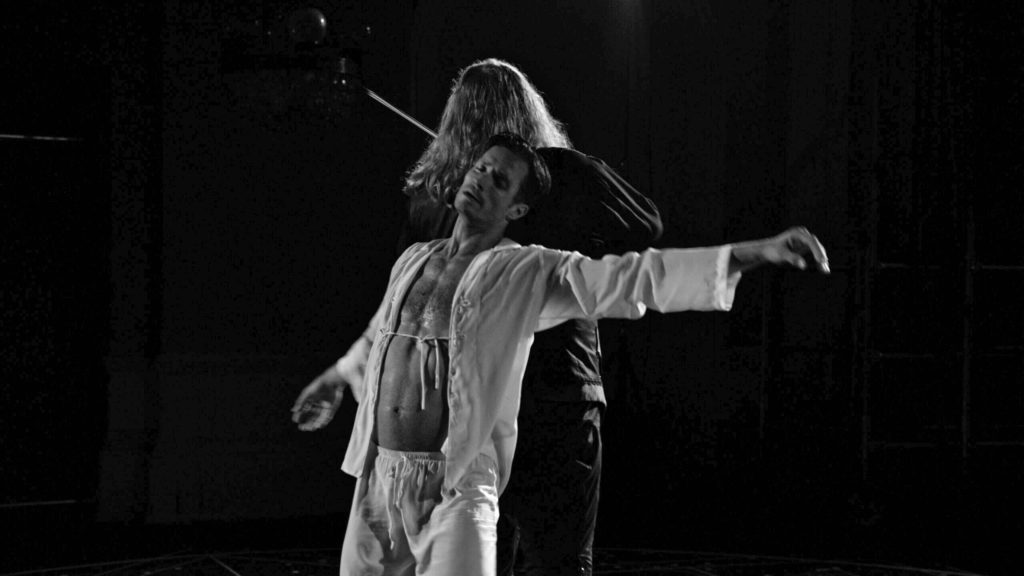Inception, Royal Chapel Versailles, 2017. Royal Ontario Museum, Samuel Hall Currelly Gallery, 2018.
Inception with Annunciation, Royal Chapel, 2018. Harris Theater for Music and Dance, Millennium Park Chicago. Royal Ontario Museum, 2019.
The Eye and Eye’s Delight, Something Rich and Strange, Vimeo, 2020.
From haunting pas de deux for solo violin and dancer to dramatic cantata for baritone and soprano to impassioned art song to lavish stage work for multiple singers, chorus, corps de ballet and period ensemble, Angel, Opera Atelier’s most recent venture into the realm of digital film, brings the company’s exhaustive four-year artistic journey to a close on an epic high note. Evolving from a loosely linked succession of discrete far-flung workshop presentations to final expansive realization, the profoundly cinematic 70-minute chronicle of intense spiritual experience utterly overwhelms, sweeping us into a vortex of life and loss, divinity and devilish doom.
Sourced from selected verses of Paradise Lost by mid-17th century English poet John Milton, with considerably more numerous contributions from modernist Rainer Maria Rilke, Angel orbits around two stylistically opposed textual poles. Writing in sprawling blank verse, Milton’s portrayal of Satan as fallen angel, Adam and Eve represented as unwitting progenitors of original sin, speaks long and loud of the resolute Puritan moralist’s Calvinist zeal. Conversely, Rilke’s taut, image-laden verse, crisply translated by present day author Grace Andreacchi, is a universe removed from thunderous Old Testament story-telling. More symbolist than mystic, the early twentieth century Austrian fantasist projects an oftentimes startling air of earthly transcendence, a re-inventor of Catholic allegory in the shattered era of a godforsaken Great War.
Directed by Marshall Pynkoski to swirling fluid effect, meticulously choreographed by Jeannette Lajeunesse Zingg, Angel gives both literary giants, however opposed Milton and Rilke’s attitudes to faith and worship, ample opportunity to be heard. The push and pull of divergent belief systems crackles with tension, the ineffable made tangible, the human touched by the preternatural. The vastness of OA’s preferred pandemic studio space, Toronto’s historic St. Lawrence Hall, becomes a tremulous cosmos. Lucifer rages and rebels, incandescent pride ablaze. Better to reign in Hell, then serve in Heaven. All creation is in peril. A sturdy scaffold towers above Pandemonium, a ready stairway to and from heaven. One by one, angels appear, charged with goodness. Shafts of light pierce the darkness. The world is wrapped in a sheet of dazzling brilliance. Salvation is at hand.
The level of technical mastery on display here is nothing short of astounding. Director of Photography Marcel Canzona conjures pure film magic, classic black and white expressionism in true noir tradition strikingly flashed with colour from time to time. Hell blazes with fire red flame. A radiant full moon magically morphs into a great rose window of glowing stained glass, a naked Adam standing before it, slowly rotating, touched by Apotheosis. Editing and visual FX are stunning.
Musically, Angel displays much of the same breadth of imagination. Although not strictly bound to the five loosely related chapters that comprise the program as a whole — Separation, Creation, Sacrifice, Harbinger, Incarnation — harmony and form are generally reflective of context, occasional crossover pieces notwithstanding. Lyricism can and does reside in even the most unsettling moments of scena. Lucifer is a dangerously beguiling manipulator of heartstrings.
A wealth of stylish, highly original contemporary compositions featuring arias, ariosos, duets and choral settings by Edwin Huizinga and Christopher Bagan rightfully take pride of place centre stage with 17th and 18th century theatrical luminaries, Matthew Locke and William Boyce, briefly sharing the spotlight by way of fleeting entr’actes. Striking a distinctly reformist chord, Summer 1 and Winter 1 from Recomposed by Max Richter: Vivaldi – The Four Seasons (2012) subtly re-engineers the iconic Baroque standard, sprinkling it with fresh new sparkle. Urgently expressed, tightened tempi and motifs are eagerly recast by Pynkoski and Zingg in turn as dance.
Appearing as heavenly observers, more omniscient knowledge keepers than winged agents of God’s will, tenor Colin Ainsworth and soprano Measha Brueggergosman soar, singing with formidable strength of emotion and purpose. The two are exceedingly well counterpointed as angelic principals, Ainsworth clarion-bright and operatic, Brueggergosman gentler, poised, limitlessly compassionate.
Bass-baritone Douglas Williams is Satan. Impossibly charismatic, gifted with a voice of impressive resonance and command, the outrageously handsome singer-actor clearly revels in the role, turning in a performance of magisterial wickedness. The ultimate tragic anti-hero. The shining one. Blasphemous and bombastic. And ultimately deeply pitiable. Me miserable, which way shall I fly/Infinite wrath, and infinite despair?/Which way I fly is Hell, myself am Hell!, sings Williams to a driving, Middle Eastern-flavoured beat. A vivid moment of tortured self-reflection, a sentiment shared by a frantic, fearful Adam and Eve.
Soprano Meghan Lindsay and baritone John Tibbetts bring a measure of palpable complexity to the prototypical Biblical innocents lured into irresistible temptation and sin. What begins as a horror-filled duet, singers vocally scrambling over one another in terror as the enormity of their transgression takes hold, ends in a measure of silent surrender with the hard-won realization that …we’re not much at home here in the world we have made.
Reprising their roles from Annunciation as the Archangel Gabriel and Virgin, dancer Tyler Gledhill, baritone Jesse Blumberg and soprano Mireille Asselin electrify in a scene charged with great bittersweetness and tenderness, Gledhill later returning with Huizinga to perform the exquisitely poignant Inception. Time stops. Dance and violin twin and twine. Heaven and earth stand still. The music mesmerizes.
A first-rate assemblage of superb period players drawn from the ranks of Tafelmusik Baroque Orchestra conducted by David Fallis, Elisa Citterio Music Director and First Violin, partners, endowing Angel with immense beauty and power, boosting it to breathtaking heights.
A fine cohort of excellent choristers courtesy the Nathaniel Dett Chorale led by Artistic Director D. Brainerd Blyden-Taylor lifts the heart.
Opera Atelier’s Angel flies straight to the centre of the soul.
* * *
Opera Atelier’s digital film, Angel, streams on Vimeo until Friday, November 12. Tickets $30 at https://www.rcmusic.com/events-and-performances/opera-atelier-presents-angel


